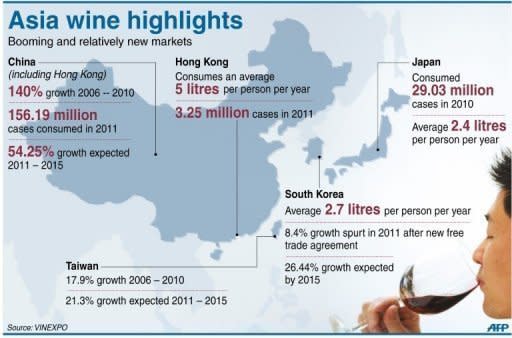Asia's biggest wine expo opens in Hong Kong
The who's who of the wine world gathered in Hong Kong on Tuesday for Asia's biggest wine and spirits fair, hoping to tap the booming but still relatively young Chinese market. Organisers of the three-day Vinexpo Asia-Pacific expect demand for imported wine to weather the slowdown in Chinese economic growth, forecast to fall to 7.5 percent this year from 9.2 percent in 2011. A deep dip in prices of Bordeaux's most prestigious, investment-grade wines last year suggests the Chinese-driven speculative bubble may have burst, but the market for more modest mid-range wines will open up, they said. "The promise of the Chinese market and the Asian market continues to be very high. The growth is still there," Vinexpo chief executive Robert Beynat told AFP. China leapt to fifth place of top wine consuming nations last year, overtaking Britain, and Asia is expected to account for more than half of worldwide growth in consumption over the next three years, organisers said. China is the world's biggest drinker of spirits, with 995 million cases guzzled in 2010 -- almost double the volume consumed in 2006, according to Vinexpo. But the average mainland Chinese drinker still only consumes 1.3 litres (0.34 US gallons) of wine a year, compared with 2.4 litres in Japan and 50 litres in France. Wine producers are looking forward to a "bright future" as the market matures and consumption grows, especially as Chinese drinkers learn that good wine need not cost a fortune, Beynat said. "It's fashionable (in China) to have very expensive wine and to offer your friends very expensive wine. The challenge for the industry is to show that there is good wine at every price," he said. Around 1,000 exhibitors attended the expo at Hong Kong's harbourside convention centre, from the great French chateaux to major global distributors and the best of the "new world" such as California and Australia. French wines account for around 45 percent of Chinese imports in terms of value. The Bordeaux region alone sold 334 million euros ($420 million) worth of wine to China last year, a 91 percent increase over the year before. "The solid base we have, but we need to look at how we go to the next step," Bordeaux Wine Council president Georges Haushalter said. "We need to make sure that the knowledge of wine, and of Bordeaux wines especially, goes deep down to the Chinese consumer so that it's beyond a fashionable item as it is nowadays." He said the big Bordeaux names such as Lafite Rothschild and Petrus were already well known in China, but the mid-range appellations tended to be overlooked. "Probably where we deliver the best value is in the middle of the range, and when this core range starts to make inroads you really feel that Bordeaux has built some roots," Haushalter said. Nikki Palun, the Mandarin-speaking Asia-Pacific export manager for De Bortoli Wines of Australia, said Chinese consumers were becoming increasingly sophisticated. "The Chinese consumer is very intelligent and they are learning fast, and they can discern quality," she told AFP at the Australian pavilion in the cavernous expo hall. "We're really trying to pitch that you can get a wine of similar quality to some of the Bordeaux, but not pay the price." She said there was an "incredible suspicion" in China about counterfeit wines, which was hurting the premium labels. "A lot of the wealthy Chinese are buying their Bordeaux, but with counterfeit problems they're now looking to buy other brands," she said. China and Hong Kong represent the third-largest export market for Australian wine by value, at more than Aus$268 million (US$262 million), according to official figures.




